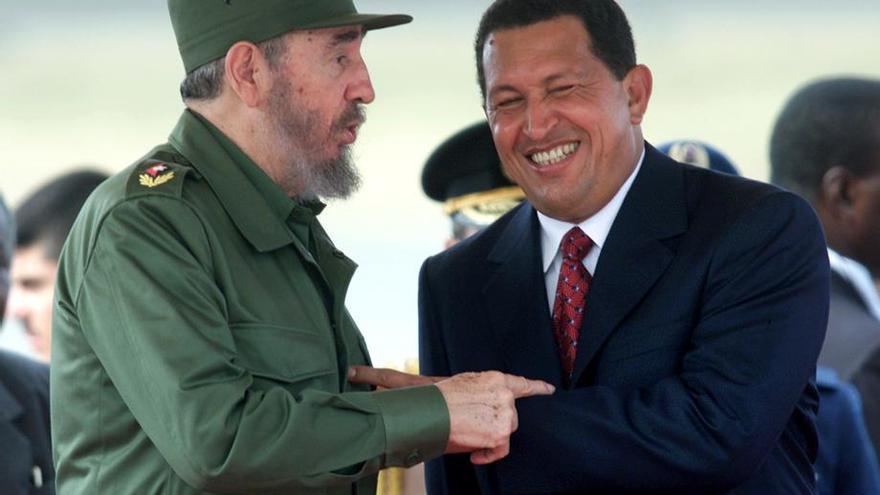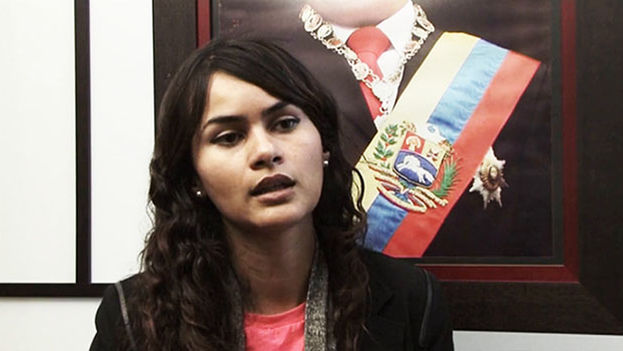
![]() 14ymedio, Luis Nieto, Montevideo, May 14, 2019 — Hugo Chavez’s first visit to Uruguay might have gone unnoticed but for two local politicians: General Liber Seregni refused to meet with the leader of a military coup and Eleuterio Fernandez Huidobro, a man was always on the lookout for a soldier with whom he could share power, had long championed him.
14ymedio, Luis Nieto, Montevideo, May 14, 2019 — Hugo Chavez’s first visit to Uruguay might have gone unnoticed but for two local politicians: General Liber Seregni refused to meet with the leader of a military coup and Eleuterio Fernandez Huidobro, a man was always on the lookout for a soldier with whom he could share power, had long championed him.
Standing atop a mountain of foreign money, Chavez laid the foundations for his 21st century version of socialism at a time when the Marxist-Leninist model had collapsed all over the world, as if struck by lightning. A Venezuelan soldier, who had made a name for himself by attempting a coup d’etat against a social-democratic president, suddenly took on the gargantuan task of finding a new path to achieving socialism, and of redefining socialism itself.
Two classic socialist pamphlets — Lenin’s What Is to Be Done? and Mao’s Little Red Book — seemed outmoded after Lieutenant Colonel Chavez believed he had found a formula in those billions of dollars which later were lost to bribes, theft, gifts and purchases of goodwill that could tilt the scales of any international organization. Much of that fortune went to a business partner willing to share its revolutionary know-how: Fidel Castro’s Cuba. continue reading
Until it collapsed, the Soviet Union paid the Cuban government the equivalent of roughly five billion dollars a year to turn the island into one big aircraft carrier stationed a few miles off the coast of its main enemy. But by 1990, as the Eastern European Socialist Bloc collapsed, things had started to go very badly for Castro and his countrymen. No solution had appeared on the horizon until a somewhat unsophisticated soldier swaggered into Castro’s office, desperate to be seen as a comrade. Chavez did not make a good impression on Castro. He was not to Castro’s taste but his petroleum was. He came from a country on which Castro had long set his sights, so the Cuban leader lent his support in the form of guerilla fighters.
In his over-exuberance, Chavez made a proposal to Fidel Castro that they unify their two countries. The island’s strongman latched onto the idea immediately but had no intention of publicizing it. As it turned out, things happened as Chavez had proposed, but on Fidel Castro’s terms: in the form of medical help to a friendly country.
The Cuban government gave Ramiro Valdes, one of the original leaders of the Cuban revolution, the task of getting 20,000 Cuban soldiers into Venezuela. Valdes then took command of the unofficial new country, appropriating its anthems, flags and diplomatic missions, and setting a single military command structure. Only after the current president of the National Assembly, Juan Guaidó, and his deputies took charge of the resistance did the scope of Cuba’s intervention become widely known.
Is there a moral justification for spying on a foreign government, meddling in its politics and influencing its political parties because of some perceived “good.” What is the “noble goal”? Is socialism as we know it a dream to be pursued or a nightmare from which we are never allowed to wake up?
Of course, the vast majority of Uruguayans reject the notion of a another country such as the United States, whether the president be Trump or Obama, determining the direction and manner we choose to legitimately exercise the right to elect our leaders.
But it is also true that the reason the Uruguayan left ruminates so furiously is because it has run out of formulas to copy and paste. The smell of gunpowder still lingers on, because once all the bloodsuckers are exterminated, the world should be a paradise for all humanity, singing with our fists held high. But that has not come to pass.
On his deathbed Chavez named Maduro as his successor. The choice was between Maduro or Diosdado Cabello. He had no doubt that the former bus driver from Caracas would make a good workers’ president. Cabello, by contrast, had never enjoyed a friendly relationship with the Cubans.
Maduro is the product of a Cuban political training center run by the Union of Young Communists while the current minister of defense, Vladimir Padrino Lopez, is a member of the first graduating class of a school run by the Cuban army for senior Venezuelan officials. Cabello was left to deal with narcotrafficking, a political bomb always about to go off.
The threat of invasion from the United States is somewhat like the tale of the bogeyman. In fact, it is just as dangerous to let Cuba remain there, eternalizing the crisis, with the result being hunger, misery and death. The Cuban regime’s needs to squeeze out every last drop of Venezuelan wealth to pay for the failure of its socialist model.
Juan Guaidó and his deputies in the National Assembly advance and retreat before trying again, both in Venezuela and abroad. It is the struggle of David against Goliath.
Meanwhile, in a meeting on Friday, May 3, member countries of the Lima Group — Argentina, Brazil, Canada, Chile, Colombia, Cost Rica, Guatemala, Honduras, Panama, Paraguay and Peru — passed a resolution asking Cuba to play a role in resolving the Venezuelan conflict.
Finally, somebody gets it. The opposition’s improvisational approach has called its strategy into question. After the president of the Venezuelan parliament issued an executive order for the release of Leopoldo Lopez, representatives of the Lima Group countries adopted three measures in support of the National Assembly: 1) an investigation into money laundering by business associates, relatives and officials with ties to the Maduro government, 2) actions aimed at those countries propping up the regime (Russia, China, Turkey and Cuba) to convince them that supporting Maduro is not the best option and 3) support for the agenda of the Venezuelan parliament, specifically its calls for Maduro to step aside, a transitional government and free elections.
None of this was possible a few months ago. The courage and the successes of the deputies of the National Assembly have opened the way, although some only consider their mistakes.
_____________________
Editor’s note: This editorial was previously published in the Uruguayan weekly Voces and is reproduced here with permission of the author.
The 14ymedio team is committed to serious journalism that reflects the reality of deep Cuba. Thank you for joining us on this long road. We invite you to continue supporting us, but this time by becoming a member of 14ymedio. Together we can continue to transform journalism in Cuba.


